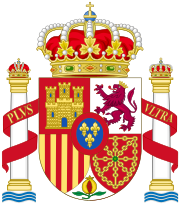
Back Administració local d'Espanya Catalan Administración local (España) Spanish Samorząd terytorialny w Hiszpanii Polish
 |
|---|
Local government in Spain refers to the government and administration of what the Constitution calls "local entities", which are primarily municipalities, but also groups of municipalities including provinces, metropolitan areas, comarcas and mancomunidades and sub-municipal groups known as Minor local entities (Spanish: Entidad de Ámbito Territorial Inferior al Municipio).[1][2]
The administration of these entities is mostly provided by a council, each with a different name and set of rules (Spanish: régimen). These councils can be collectively thought of as a third sphere (or tier) of government, the first being the State (Spain) and the second, the regional governments.[3][4]
For various reasons, local government is heterogeneous, not distributed in a balanced way across the nation,[5] involves duplication of services[6] and has even been labelled dysfunctional.[7] Although Spain adheres to the European Charter of Local Self-Government, it declares itself not bound to the full extent by the requirement for direct elections of all local government authorities. [8]
- ^ Local Government Act 1985, Articles 40-44.
- ^ MPA, paragraph 4.
- ^ Moreno 2016, p. 183.
- ^ Albet i Mas 2019, p. 20.
- ^ Cools & Verbeek 2013, Explanatory Memorandum paragraph 12 on page 7.
- ^ Cools & Verbeek 2013, Recommendation 336 (2013) paragraph 5(c).
- ^ Albet i Mas 2019, abstract.
- ^ Cools & Verbeek 2013, Recommendation 336 (2013) paragraph 2(b).
© MMXXIII Rich X Search. We shall prevail. All rights reserved. Rich X Search